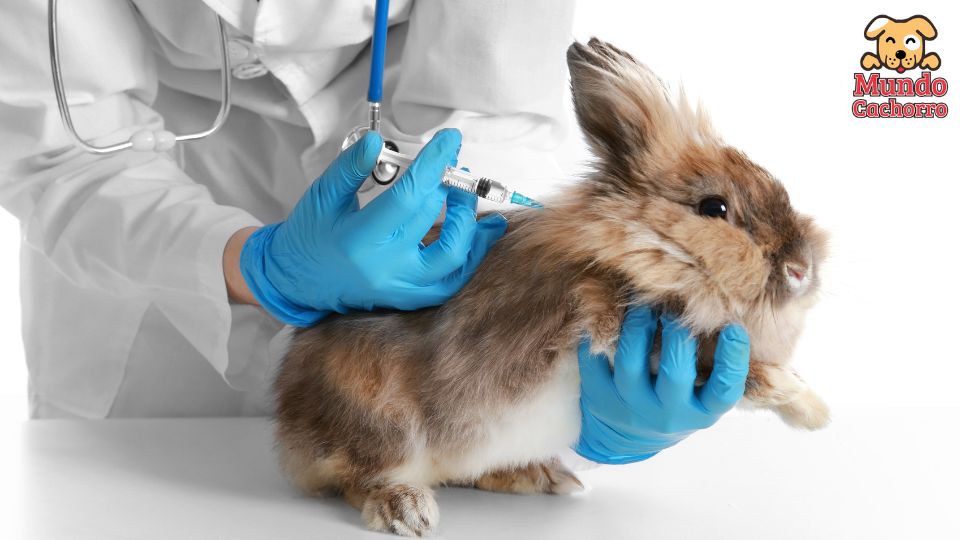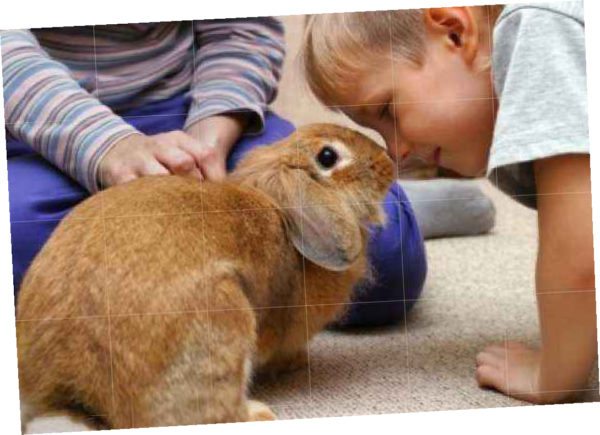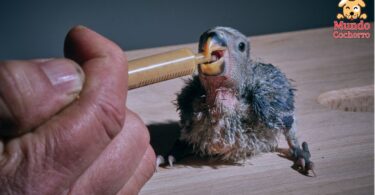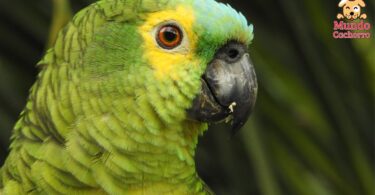Rabbits, like other domestic animals, need specific care to stay healthy. Among this care, vaccination plays a crucial role in preventing diseases that can be serious or even fatal. Although some rabbit owners are not aware of the importance of vaccinations, they are essential to protect your pet from life-threatening infections. In this article, we explain which are the main vaccinations that every rabbit should receive and why they are so important for their health.
Indice

1. Why is it important to vaccinate rabbits?
Vaccinating your rabbit is one of the most effective ways to protect it against serious diseases that have no cure or are difficult to treat. As in other animals, vaccines prepare the rabbit’s immune system to fight certain viruses and bacteria, which reduces the risk of getting sick or, in case of contracting the disease, that the symptoms are less severe.
Diseases such as myxomatosis and viral hemorrhagic disease (VHD) can be fatal to rabbits. These diseases spread rapidly and can cause death within days. Vaccinations are the best way to prevent your rabbit from contracting these diseases, which can be transmitted by insects, other animals or even contaminated objects.
Prevention rather than treatment
It is much easier and safer to prevent a disease through vaccination than to treat it once it has developed. Some diseases that affect rabbits have a high mortality rate, and treatment is often limited and, in many cases, ineffective. By vaccinating your rabbit, you not only protect its health, but also avoid the pain and suffering that these diseases can cause.
2. Vaccination against myxomatosis
Myxomatosis is one of the most dangerous and common diseases affecting rabbits. Caused by the myxoma virus, this disease is primarily transmitted by blood-sucking insects such as mosquitoes and fleas, but can also be spread by direct contact with infected rabbits. Symptoms include inflammation of the eyes, ears, nose and genitals, and in advanced stages, it can cause death within a few days.
Vaccination against myxomatosis is essential for all rabbits, especially if they live outdoors or have contact with other rabbits. Vaccination is generally administered once a year, and can be combined with the vaccine against viral hemorrhagic disease for convenience.
Efficacy and safety of the vaccine
Myxomatosis vaccine is highly effective and has few side effects. Rabbits that receive this vaccine have a high chance of surviving exposure to the virus, and although they may develop mild symptoms, the disease is much less likely to be fatal. It is important to follow the vaccination schedule recommended by your veterinarian to maintain your rabbit’s immunity.
3. Vaccination against viral hemorrhagic disease (VHD)
Viral hemorrhagic disease (VHD), also known as hemorrhagic fever, is another extremely dangerous disease for rabbits. This virus is transmitted through direct contact with other infected rabbits, as well as through contaminated surfaces, food or insects. Symptoms include high fever, lethargy, nosebleeds and, in many cases, sudden death without previous signs.
VHD vaccination is essential to protect your rabbit from this deadly disease. There are two main variants of the virus, VHD-1 and VHD-2, and it is important to ensure that the vaccine your rabbit receives protects against both.
Vaccination and prevention
VHD vaccine is usually given once a year, and in many countries, it is possible to combine it with myxomatosis vaccine. As with myxomatosis, vaccination is the best defense against this disease, as once a rabbit is infected, treatment is very limited and, in most cases, ineffective. Prevention through vaccination is crucial to avoid the spread of this highly contagious virus.
4. When and how often should you vaccinate your rabbit?
The right time to vaccinate your rabbit depends on several factors, including its age, health status and risk of exposure to disease. Young rabbits can receive their first vaccination as early as 5 weeks of age, and then should receive annual boosters to maintain their immunity.
It is essential that you consult with your veterinarian to establish an appropriate vaccination schedule for your rabbit. Some veterinarians recommend combining myxomatosis and HDV vaccinations in a single visit, which simplifies the process and reduces stress for the animal. However, your veterinarian can tailor the schedule according to your rabbit’s specific needs and environmental conditions.
Revision and boosters
In addition to annual vaccinations, it is important to take your rabbit for regular checkups to ensure that its health remains in good condition. During these visits, your veterinarian can assess whether additional boosters or adjustments to the vaccination schedule are needed. Keeping a record of your rabbit’s vaccinations will help you stay on schedule and ensure that no important doses are missed.
5. Special considerations for indoor and outdoor rabbits
Although some rabbit owners think that indoor rabbits do not need to be vaccinated, this is a mistake. Even rabbits that live exclusively indoors can be at risk for diseases such as myxomatosis and HDV, as these viruses can be carried by insects or introduced into the home through clothing, shoes or other animals.
Rabbits that spend time outdoors are at greater risk, as they are more exposed to insects and other animals that can carry diseases. For these rabbits, vaccination is even more critical. In addition, additional insect control methods and biosecurity measures should be considered to minimize the risk of exposure.
Additional protective measures
To protect outdoor rabbits, it is advisable to use fine mesh on cages to prevent insect access and keep the area clean and free of debris that may attract insects. If you have multiple rabbits, ensure that all are vaccinated and that good hygiene is maintained to prevent the spread of disease within the group.
Protecting your rabbit is an essential responsibility
Vaccinating your rabbit is not only a vital protective measure, but also an act of responsibility as an owner. These vaccinations, while sometimes overlooked, can make the difference between life and death in the event of a disease outbreak. By following a proper vaccination schedule and taking additional preventative measures, you ensure that your rabbit has a long, healthy and disease-free life. Don’t underestimate the importance of these vaccinations and consult your veterinarian regularly to keep your rabbit protected and in top condition.







